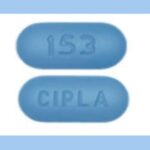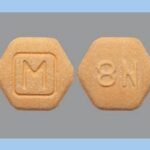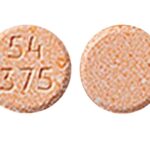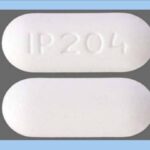H 49 Pill: Uses, Dosage, Side Effects, Toothache
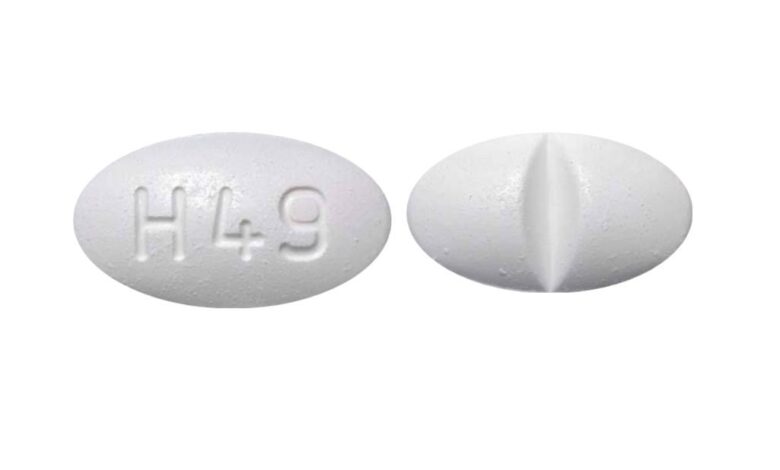
What is the H 49 pill used for?
The white oval pill with the imprint H 49 has been identified as Sulfamethoxazole and Trimethoprim 800 mg / 160 mg supplied by Aurobindo Pharma. H 49 pill is used to treat certain bacterial infections, such as pneumonia (a lung infection), bronchitis (infection of the tubes leading to the lungs), and infections of the urinary tract, ears, and intestines. It also is used to treat ‘travelers’ diarrhea.
H49 pill belongs to a class of medications called sulfonamides. It works by stopping the growth of bacteria. Antibiotics will not kill viruses that can cause colds, flu, or other viral infections. Introduced in 1968, Sulfamethoxazole and Trimethoprim remains a popular antibiotic because of its low cost, effectiveness, and familiarity among clinicians. It is one of the most frequently prescribed antibiotics for urinary tract infections in Canada and the United States.
How to use the H 49 pill
Take H 49 pill by mouth, as directed by your doctor, with a full glass of water (8 ounces / 240 milliliters). If a stomach upset occurs, take it with food or milk. Drink plenty of fluids while taking this medication to lower the unlikely risk of kidney stones forming, unless your doctor advises you otherwise. Dosage is based on your medical condition and response to treatment.
The standard adult dose of H 49 pill is 1 every 12 hours for 10 to 14 days. Your doctor may adjust this dose if needed. For the best effect, take this antibiotic at evenly spaced times. To help you remember, take this medication at the same time(s) every day.
Continue to take this medication until the full prescribed amount is finished, even if symptoms disappear after a few days. Stopping it too early may allow bacteria to continue to grow, which may result in a relapse of the infection. Tell your doctor if your condition persists or worsens.
Will H 49 pill work for a toothache?
Antibiotics like H 49 pill will not cure toothache, they will only mask the problem until you have something done about the tooth itself. They may stop the pain for a few days, weeks, or even months, but it will always come back with a vengeance.
Sulfamethoxazole and trimethoprim combination is used to treat infections including urinary tract infections, middle ear infections (otitis media), bronchitis, traveler’s diarrhea, and shigellosis (bacillary dysentery)
What are the side effects of H 49 pill?
While using the H 49 pill, any of the following side effects can occur:
More common
- Black, tarry stools
- blistering, peeling, or loosening of the skin
- changes in skin color
- chest pain or tightness
- chills
- clay-colored stools
- cough or hoarseness
- dark urine
- diarrhea
- dizziness
- fever
- general feeling of tiredness or weakness
- headache
- itching, skin rash
- joint or muscle pain
- light-colored stools
- loss of appetite
- lower back or side pain
- nausea
- pain, tenderness, or swelling of the foot or leg
- painful or difficult urination
- pale skin
- red skin lesions, often with a purple center
- red, irritated eyes
- sore throat
- sores, ulcers, or white spots in the mouth or on the lips
- stomach pain
- swollen or painful glands
- trouble breathing
- unpleasant breath odor
- unusual bleeding or bruising
- vomiting of blood
- yellow eyes or skin
Incidence not known
- Back, leg, or stomach pains
- bleeding gums
- blindness or vision changes
- bloating
- blood in the urine or stools
- bluish-colored lips, fingernails, or palms
- burning, crawling, itching, numbness, painful, prickling, “pins and needles”, or tingling feelings
- burning of the face or mouth
- cloudy urine
- clumsiness or unsteadiness
- confusion
- constipation
- continuing ringing or buzzing or other unexplained noise in the ears
- cracks in the skin
- decreased frequency or amount of urine
- difficulty with swallowing
- fainting spells
- fast, pounding, or irregular heartbeat or pulse
- general body swelling
- general feeling of discomfort or illness
- hair loss
- hearing loss
- hives
- increased thirst
- indigestion
- large, flat, blue, or purplish patches in the skin
- large, hive-like swelling on the face, eyelids, lips, tongue, throat, hands, legs, feet, or sex organs
- loss of heat from the body
- muscle or joint pain
- nosebleeds
- not able to pass urine
- numbness or tingling in the hands, feet, or lips
- pain or burning while urinating
- pinpoint red spots on the skin
- puffiness or swelling of the eyelids or around the eyes, face, lips, or tongue
- raised red swellings on the skin, the buttocks, legs, or ankles
- redness of the white part of the eyes
- redness, swelling, or soreness of the tongue
- seizures
- soreness of the muscles
- stiff neck or back
- stomach tenderness
- swelling of the face, hands, legs, and feet
- unsteadiness, trembling, or other problems with muscle control or coordination
- weakness in the hands or feet
- weakness or heaviness of the legs
- weight gain or loss
Some side effects may occur that usually do not need medical attention. These side effects may go away during treatment as your body adjusts to the medicine. Also, your health care professional may be able to tell you about ways to prevent or reduce some of these side effects. Check with your health care professional if any of the following side effects continue or are bothersome or if you have any questions about them:
More common
- Passing of gas
Incidence not known
- Discouragement
- feeling of constant movement of self or surroundings
- feeling sad or empty
- increased sensitivity of the skin to sunlight
- lack of feeling or emotion
- loss of interest or pleasure
- muscle pain, stiffness, cramps, or spasms
- nervousness
- redness or other discoloration of the skin
- seeing, hearing, or feeling things that are not there
- sensation of spinning
- severe sunburn
- trouble concentrating
- trouble sleeping
- uncaring
- weight loss
Other side effects not listed may also occur in some patients. If you notice any other effects, check with your healthcare professional.
Call your doctor for medical advice about side effects. You may report side effects to the FDA at 1-800-FDA-1088.
What medications may interact with H 49 pill?
Using H 49 pill with any of the following medicines is not recommended. Your doctor may decide not to treat you with this medication or change some of the other medicines you take.
• Dofetilide
• Levomethadyl
• Methenamine
Using this medicine with any of the following medicines is usually not recommended, but may be required in some cases. If both medicines are prescribed together, your doctor may change the dose or how often you use one or both of the medicines.
• Acecainide
• Acenocoumarol
• Ajmaline
• Amiloride
• Amitriptyline
• Amoxapine
• Aprindine
• Arsenic Trioxide
• Astemizole
• Azathioprine
• Azilsartan
• Azilsartan Medoxomil
• Azimilide
• Benazepril
• Bretylium
• Candesartan Cilexetil
• Captopril
• Ceritinib
• Chloral Hydrate
• Chloroquine
• Chlorpromazine
• Cholera Vaccine, Live
• Clarithromycin
• Desipramine
• Dibenzepin
• Digoxin
• Disopyramide
• Dolasetron
• Doxepin
• Dronedarone
• Droperidol
• Enalapril
• Enalaprilat
• Enflurane
• Eplerenone
• Eprosartan
• Erythromycin
• Flecainide
• Fluconazole
• Fluoxetine
• Foscarnet
• Fosinopril
• Gemifloxacin
• Halofantrine
• Haloperidol
• Halothane
• Hydroquinidine
• Ibutilide
• Imipramine
• Irbesartan
• Isoflurane
• Isradipine
• Leucovorin
• Lidoflazine
• Lisinopril
• Lorcainide
• Losartan
• Mefloquine
• Mercaptopurine
• Methotrexate
• Moexipril
• Nortriptyline
• Octreotide
• Olmesartan Medoxomil
• Pentamidine
• Perindopril
• Pirmenol
• Porfimer
• Prajmaline
• Probucol
• Procainamide
• Prochlorperazine
• Propafenone
• Pyrimethamine
• Quinapril
• Quinidine
• Ramipril
• Risperidone
• Sapropterin
• Sematilide
• Sertindole
• Sotalol
• Spiramycin
• Spironolactone
• Sultopride
• Tedisamil
• Telithromycin
• Telmisartan
• Trandolapril
• Triamterene
• Trifluoperazine
• Trimipramine
• Valsartan
• Warfarin
• Zofenopril
• Zotepine
Using this medicine with any of the following medicines may cause an increased risk of certain side effects, but using both drugs may be the best treatment for you. If both medicines are prescribed together, your doctor may change the dose or how often you use one or both of the medicines.
• Acetohexamide
• Amantadine
• Aminolevulinic Acid
• Anisindione
• Didanosine
• Fosphenytoin
• Phenytoin
• Repaglinide
• Rifabutin
• Rosiglitazone
• Tolbutamide
Other Interactions
Certain medicines should not be used at or around the time of eating food or eating certain types of food since interactions may occur. Using alcohol or tobacco with certain medicines may also cause interactions to occur. The following interactions have been selected on the basis of their potential significance and are not necessarily all-inclusive.
Using this medicine with any of the following is usually not recommended, but may be unavoidable in some cases. If used together, your doctor may change the dose or how often you use this medicine or give you special instructions about the use of food, alcohol, or tobacco.

